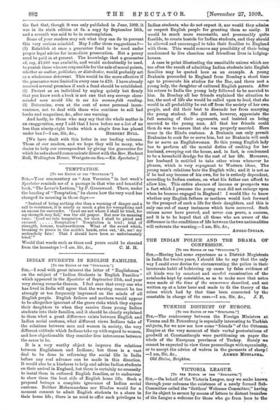INDIAN STUDENTS IN ENGLISH FAMILIES.
[To THE EDITOR OP THE "SPECTATOR."
Silt,—I read with great interest the letter of " Englishman " on the subject of "Indian Students in English Families"
which appeared in the Spectator of September 11th, and your very strong remarks thereon. I feel sure that every one who
has lived in India will agree that the warning cannot be too strongly or too frequently impressed on the minds of all English people. English fathers and mothers would appear to be altogether ignorant of the grave risks which they expose their daughters to when they receive these young Indian students into their families, and it should be clearly explained to them what a great difference exists between English and Indian social customs, what different views Indians take of the relations between men and women in society, the very different attitude which Indians take up with regard to women, and how objectionable they consider free intercourse between the sexes to be.
It is a very worthy object to improve the relations between Englishmen and Indians ; but there is a vast deal to be done in reforming the social life in India before any real advance can be made in this direction. It would also be a kindness to help and advise Indian students on their arrival in England, but there is certainly no necessity to instal them in cultured English families, or to endeavour to show them the best side of English home life. Such a proposal betrays a complete ignorance of Indian social customs. Neither Mohammedans nor Hindus would for a moment consent to admit English students to a share in their home life; there is no need to offer such privileges to Indian students, who do not expect it, nor would they admire or respect English people for granting them so easily. It would be much more reasonable, and presumably quite feasible, to create hostels for Indian students, and they should be allowed and encouraged to take their families to England with them. This would remove any possibility of their being condemned to live cheerless and friendless lives in lodging- houses.
A case in point illustrating the unsuitable unions which are too often the result of admitting Indian students into English families may be quoted here as an example. A young Brahmin proceeded to England from Bombay a short time ago to prosecute his studies for the Bar, and there met a young lady, the daughter of cultured English parents. After his return to India the young lady followed to be married to him. In Bombay all her friends explained the situation to her, the sort of life she would be called upon to lead, that she would in all probability be cut off from the society of her own people, and did their best to dissuade her from marrying the young student. She did not, however, appreciate the full meaning of their arguments, and insisted on being married to the young man. All that her friends could then do was to ensure that she was properly married. Here come in the Hindu customs. A Brahmin can only permit Brahmins to cook for or serve him, but no Brahmin will cook for or serve an Englishwoman. So this young English lady has to perform all the menial duties of cooking for her husband, sweeping out the house, and, in fact, is condemned to be a household drudge for the rest of her life. Moreover, her husband is entitled to take other wives whenever he pleases, which is very repugnant to Western ideas. The young man's relations hate the English wife; and it is not as if he had any income of his own, for he is entirely dependent, according to Indian custom, on what his father can afford to allow him. This entire absence of income or prospects was a fact which I presume the young man did not enlarge upon when he became engaged in England ! I would like to know whether any English fathers or mothers would look forward to the prospect of such a life for their daughters, and this is only one out of many instances which have occurred. Such unions never have proved, and never can prove, a success, and it is to be hoped that all those who are aware of the difference in the conditions of life between the two nationalities will reiterate the warning.—I am, Sir, &c.,
ANGLO-INDIAR.














































 Previous page
Previous page